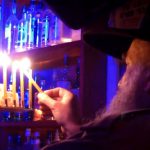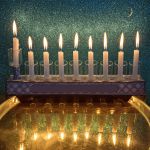
Yeshua said, “I am among you as the One who serves.” (Luke 22:27)
As the sun sets this coming Sunday, the eight—day festival of Hanukkah begins!
Special holiday menorahs will appear on windowsills in Jewish homes throughout the world, shining their bright lights for a full eight days and nights.
This menorah is called a hanukkiah, which has nine branches instead of the seven found on the Temple Menorah.
The ninth branch is very special because It holds the servant candle, or shamash in Hebrew, which is used to light the other eight candles.
The shamash candle reminds us that Yeshua came not only as the Light of God, our Messiah and Savior, but that He came to serve us:
“For even the Son of Man did not come to be served, but to serve, and to give His life as a ransom for many.” (Mark 10:45)
As we take a closer look at this ninth candle, it will help us to deepen our understanding and appreciation for who Yeshua is and what He has done for us.
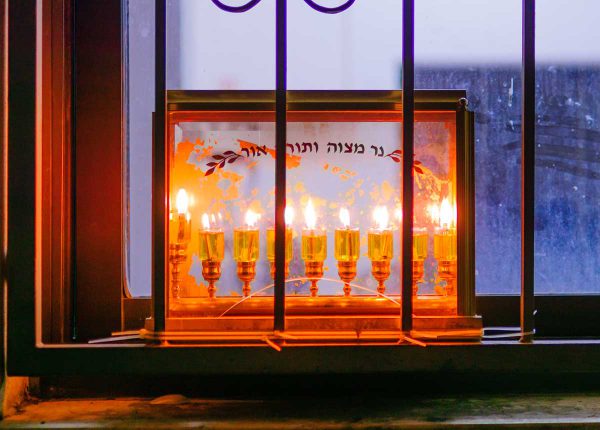
The first light on the left of this oil-based hanukkiah is the shamash, which is raised higher. All of the other eight flasks of oil are lit for the eighth night of Hanukkah. However, most people use wax candles instead of oil for ease of use.
Yeshua, Serving as the Son of God in Human Likeness
Yeshua, the Son of God, arrived on earth as a baby boy, born in a room reserved for animals!
“He made Himself nothing by taking the very nature of a servant, being made in human likeness.” (Philippians 2:7)
He lived with sinful human beings, cried with them, ate with them, and reasoned with them.
And He did it all to serve us, just like when He took on the role of Rabbi (in English, teacher of Torah).
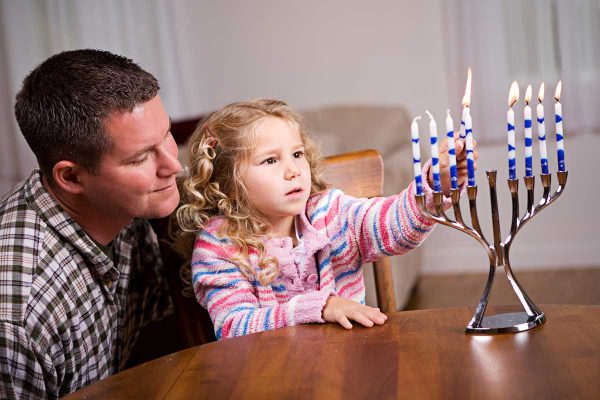
A girl is using the shamash or servant candle to light four candles for the fourth night of Hanukkah. On the first night, only one candle is lit by the shamash and stays lit until it burns out. On the second night, two candles are lit by the shamash, and so on.
Yeshua, Serving as Master Teacher
“You call Me ‘Teacher’ and ‘Lord,’ and rightly so, for that is what I am.” (John 13:13)
As a teacher, Rabbi Yeshua (as His disciples sometimes called Him) spent over three years teaching people how to love their neighbor by healing them physically as well as spiritually.
He also taught them in parables and prose to know the difference between the kingdom of God and the traditions of religion.
The crowds were amazed at His teaching “because He taught as one who had authority, and not as their teachers of the law.” (Matthew 7:29)
And even more amazing than His authoritative teaching style, Yeshua taught the disciples that they could do even greater works than He had done:
“Very truly I tell you, whoever believes in Me will do the works I have been doing, and they will do even greater things than these, because I am going to the Father.” (John 14:12; Matthew 21:21)
This truth is one of the most overlooked of all Yeshua’s teachings, yet it is the ultimate goal of every great shamash.
Pursuing that goal in holiness is another trait of a great shamash.
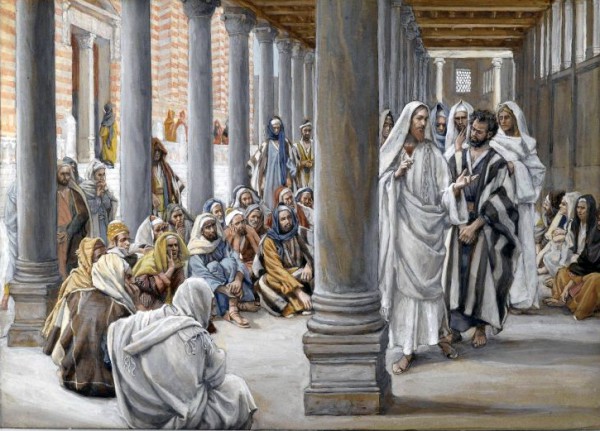
Yeshua (Jesus) Walks in the Portico of Solomon during Hanukkah (the Feast of Dedication), as mentioned in John 10:22–23 (painting by James Tissot, c. 1890)
Yeshua, Serving in Holiness
“The Father had put all things under His power” (John 13:3), and with all that authority at His disposal, Yeshua set before us His model of leadership.
He poured water over the feet of His disciples, saying:
“No servant is greater than his master” (John 13:16) and “the greatest among you must be the servant of all” (Matthew 20:26; Mark 10:43; Luke 22:26).
Likewise, the shamash (servant) is the one to give of himself or herself for the good of the others.
For instance, the first of the eight candles should not be used to light the other candles because this diminishes its light.
But the shamash stands ever ready to serve.
In fact, this candle gets its name from the person who serves in a synagogue as the chief of staff, gatekeeper, or attendant.
We see the shamash serve in a Nazareth synagogue where Yeshua read from a Torah scroll. “Then He rolled up the scroll, gave it back to the attendant [shamash] and sat down.” (Luke 4:20)
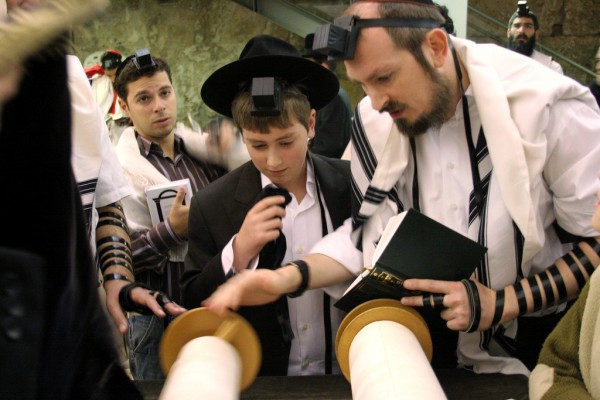
Often, a father takes on a shamash-type role during his son’s first reading of the Torah at his Bar Mitzvah. The father is following the text, ready to correct any mistakes.
To be a shamash is a privilege, which is why this person is also known as a meshamesh bakodesh (one who serves in holiness). Mashbak for short.
To be holy is to be set apart from the world in a way that points people to God, glorifying Him alone.
It is somewhat similar to how the shamash candle is set apart from the other candles, in order to keep their flames alive.
It takes a tremendous amount of work to be holy in order to set one’s own life apart so others may spend eternity with God.
And this is precisely what Yeshua came to do for us! We are also to follow in His footsteps of holiness.
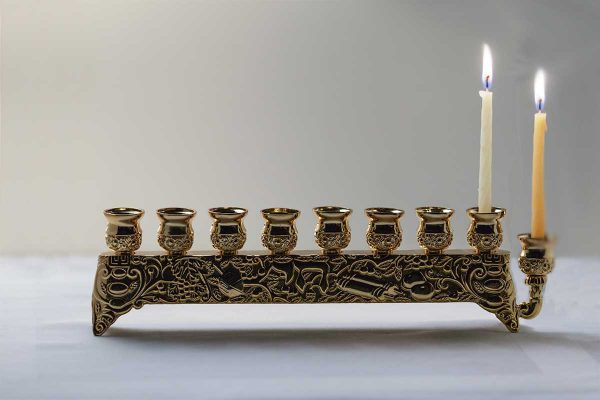
A hanukkiah with the shamash candle placed lower than the other eight candles.
Yeshua, Serving in Suffering
On some hanukkiahs (hanukkiot in Hebrew) like the one above, the shamash is placed lower than the other candles. This helps us to think about a verse in Isaiah 53:
“He had no beauty or majesty to attract us to him, nothing in his appearance that we should desire him. He was despised and rejected by mankind, a man of suffering, and familiar with pain. Like one from whom people hide their faces he was despised, and we held him in low esteem.” (Isaiah 53:2–3)
As our Shamash, Yeshua was also brought down low, laying down His life for us and for the whole world to redeem us, turning our darkness into light.
One Hasidic Jewish teaching puts it this way: “Because the Shamash lowers itself to serve the others, it ends up with an exalted position on the hanukkiah.” (Mazornet)
This insight sounds like another passage in Isaiah 53:
“By His knowledge the Righteous One, My Servant, will justify the many, as He will bear their iniquities. Therefore, I will allot Him a portion with the great.” (Isaiah 53:11–12)
In bearing our iniquities, Yeshua also took on the servant role of Mediator between us and God, the only Mediator we would ever need.

The Roman execution stake
Yeshua, Serving as Our Only Mediator
In the days of the Temple, the priests (kohen) were not the only people who could light the Menorah.
Lay people could also light it, but they were not allowed to enter the sanctuary. So, what could they do?
A long shamash pole served as one solution.
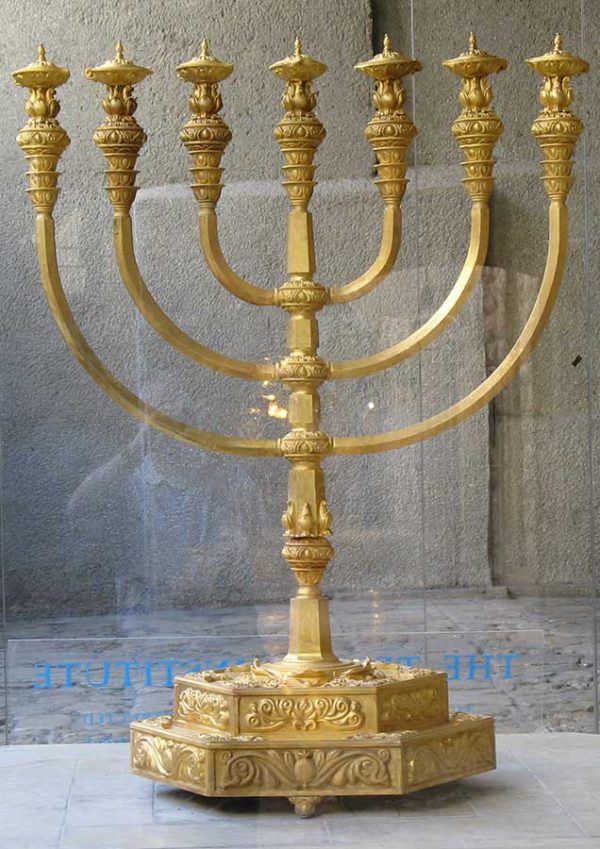
A reconstruction (by the Temple Institute in Jerusalem) of the seven—branched Menorah that sat in the Temple of Jerusalem. When there was only enough oil to last one day, it miraculously burned for eight days, according to the story in First and Second Books of Maccabees.
The pole that lay people used to light the Temple Menorah (and the priests who lit the Menorah) were pictures of Yeshua, who as our Mediator bridged the gap between us and a holy God (1 Timothy 2:5).
Even now in His glorified state, Yeshua is our High Priest living to intercede for us before the Father (Hebrews 7:24–25).
“Such a high priest truly meets our need — one who is holy, blameless, pure, set apart from sinners, exalted above the heavens.” (Hebrews 7:26)
Serving as our Mediator, Yeshua invites us to cast our cares on Him, for His yoke is easy and His burden is light (1 Peter 5:7; Matthew 11:28–29).
Yeshua, Serving as the Everlasting Light
When God first instituted the Menorah light in the Tabernacle, He said that it should never go out.
Similarly, Yeshua’s light is everlasting, lighting up Heaven itself (Revelation 21:23).
On the Hanukkiah, if one of the eight lights goes out, the shamash is picked up again to relight it.
When we are flickering out in our lives, Lord Yeshua wants to replenish our light. As the Apostle John says, Yeshua is “the true Light that gives light to every man.” (John 1:9)

Even if your light goes out, you can come to Yeshua to be rekindled and shine bright again.
He said, “I am the light of the world. Whoever follows Me will never walk in darkness, but will have the light of life.” (John 8:12)
Hanukkah, which means dedication, is a perfect time to rededicate our lives and ask for His rekindling. As the Apostle Paul told Timothy:
“Kindle anew the gift of God, which is in you ….” (2 Timothy 1:6)





